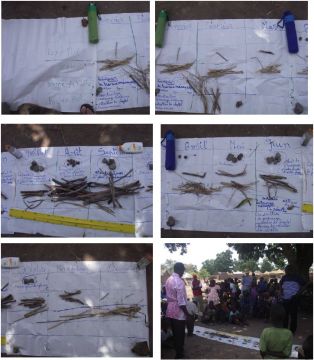Seasonal Calendar Exercise (ACCCA project)


Seasonal calendar exercise conducted in Massabla, Mali
Objectives
The seasonal calendar exercise was conducted during the field visit to the community of Massabla in March2008, as a participatory way to explore seasonal changes and priorities for adaptation strategies in thecommunity in terms of
1) gender-specific workload,
2) health issues,
3) income, expenditure and
4) water availability. The objective of the exercise was learn about changes in livelihoods over the year and to show the seasonality of agricultural and non agricultural workload, food availability, human diseases, gender-specific income and expenditure, water and forage availability.
All community members were present, with representatives from men and women participating.
Key Questions:1. What are the busiest months of the year?2. At what time of the year is food scarce?3. How does income vary over the year for men and women?4. How does rainfall vary over the year?5. How does water availability for human consumption vary over the year?6. How does livestock forage availability vary over the year?7. How do health conditions vary over the yaer?8. What are women’s/men’s activities throughout the year?9. Which could be the most appropriate season for additional activities for men and women? What timeconstraints do exist and for what reason?
Process
Participants (one representative from women and men’s groups, respectively) were asked to draw a matrix,indicating each month along one axis by a symbol. Discussions were held on the reasons for different answersby each representative, establishing linkages between different topics and encouraging discussions that couldelicit group priorities.
Output
Only preliminary results are shown here in the following photographs. These will be used to develop thematerials for the seasonal calendar, which can be used in assessing climate extremes and hazards during sensitive periods in the crop calendar.
(0) Comments
There is no content